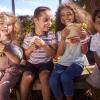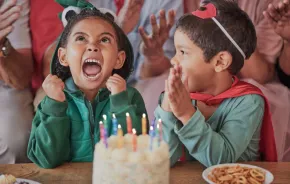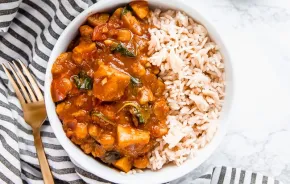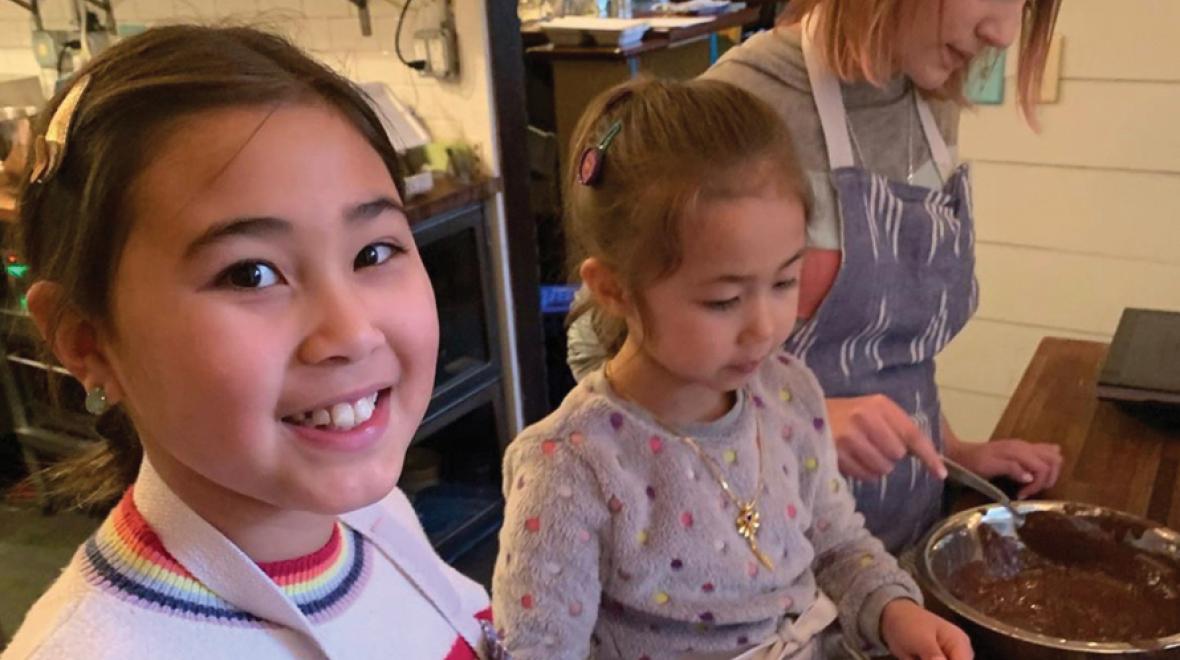
Preparing meals: It is something we humans must do like clockwork, three times a day, 365 days a year. Teaching this fundamental life skill to our children should be a priority. The goal doesn’t have to be to groom a “Master Chef Junior”-ready contestant, certainly. But teaching our kids to gain comfort and confidence in the kitchen over time establishes a foundation for healthier eating habits for the rest of their lives.
If leaving the mess and coaching to the experts sounds like the most savory solution to you, we are here to “stir” you in the right direction with a roundup of fun cooking classes and camps in the Puget Sound area. (Note: Many of these sell out fast, so book early!)
Culinary classes for Seattle and Eastside-area kids
FrogLegs Culinary Academy
Started in a mom’s cozy kitchen in Seattle’s Mount Baker neighborhood, this kid-focused company has expanded to locations on the Eastside (Kirkland) and in Seattle, including a newer location in University Village that features a drool-triggering treat mercantile. FrogLegs offers everything from camps and single-session classes to foodie field trips and birthday parties. Fun themed classes are interactive and engaging — and a touch whimsical: Tie-dye cake roll, fruity pebbles French macarons and “Encanto” are a few of the upcoming class themes.
Locations: Kirkland, University Village, Issaquah, Redmond Town Center
Ages: 4 and older
Cost: $75–$80 per day; $395 and up for camp/class series
PCC Kids Cook
With store locations sprinkled around the region, the kids’ cooking classes at these beloved neighborhood markets — and online — focus on healthy cooking, foundational skills and building confidence in the kitchen for budding chefs at all stages. PCC offers a range of cooking education ops, from classes specific to holidays, such as Halloween favorite “Monster Munchies” for the youngest of chefs, to more complex skills-building classes, like teen baking workshops for older kids. School-break camps are the icing on the cake for loving and learning about food all year around.
Locations: PCC Community Markets locations in Edmonds, Redmond, Columbia City, Green Lake Village, Redmond and Bothell, among others, offer cooking classes and camps.
Ages: Ages vary by class.
Cost: $30–$80/class; Cooking Camps $200–$250/camp
Pure Food Kids Workshop
The Beecher’s Foundation offers an in-school cooking education program tailored for fourth- and fifth-grade students in Seattle. The program is focused on providing kids with the tools, experience and knowledge they need to make healthy food choices. Workshops are free and available to any type of school: private, public or a home-school setting. Tell your favorite teacher and get the word out!
Locations: Instructors come to you! Visit the foundation’s website to schedule a workshop in the Seattle metro area.
Grades: 4–5
Cost: Workshops are offered free of charge to all schools.
Junior Sous
Dumplings, pasta and cookies — oh my! Seattle-based Junior Sous is the new kid on the block, a pop-up cooking school for kids ages 5–12 that offers hands-on culinary experiences (group and private class instruction) taught in real restaurant kitchens. Instructors Sarah Adams and Brianna Bato Draper teach participants safe knife skills, how to read recipes and proper cooking techniques.
Locations: Various Seattle-area professional restaurant kitchens
Ages: 5–12
Cost: Single-session classes $65; special Sunday Family Supper classes $120 for one child participant plus dinner for a family of four (including class participant)
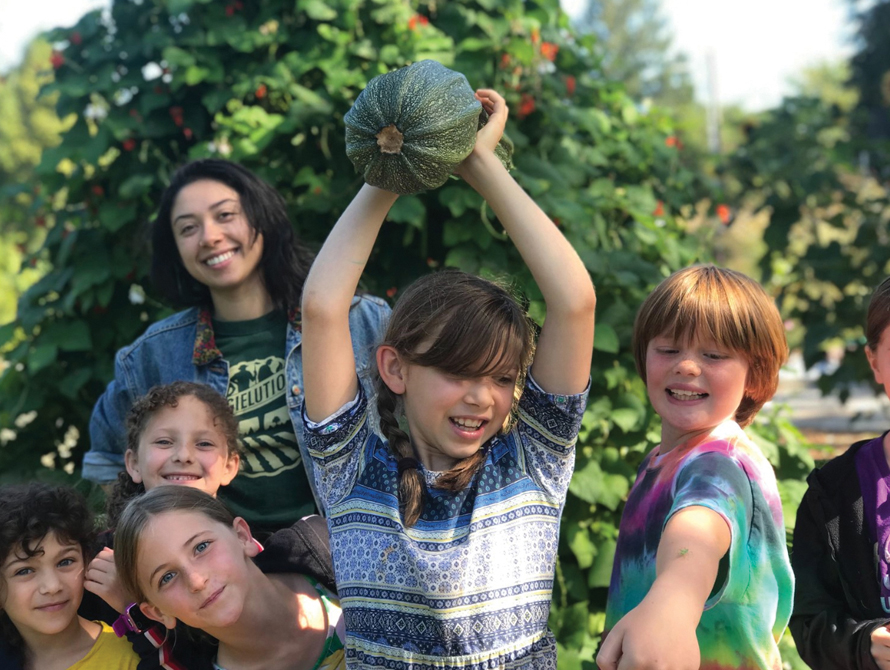
Seattle Cucina
Seattle Cucina used to host Community Dinners and after-school enrichment classes at numerous area schools and community centers. However, since the pandemic, they have transitioned away from in-person classes and now offer online self-guided classes for free! Check the website for free learning opportunities.
Locations: Online
Ages: Kid and family classes are offered for younger and older kids
Cost: Free
Seattle Parks & Recreation
Seattle Parks & Recreation offers great cooking programs for kids ages 10 and older at multiple community centers around the city, and many of them are free or low-cost. The parks department used to offer a series for the younger crowd, called “Little Chefs” (ages 2–5), at the Ballard Community Center. We're checking to see when this one will be back!
Locations: Check the website to see what classes are offered at a community center near you and to register.
Ages: 2 and older
Cost: Free or low-cost
Kirkland Parks
Kirkland Parks offers a parent/child cooking series for families with kids ages 2–4 called “Cooking for Preschoolers,” and one for older kids called “Creating in the Kitchen” for kids ages 6–10. Both series focus on teaching culinary skills and kitchen safety.
Location: McAuliffe Park, Kirkland
Ages: 2 and older
Cost: “Cooking for Preschoolers” classes cost $44–$58 for a four-week series; “Creating in the Kitchen” costs $70 for a four-week series.
Bellevue Parks & Community Services
Bellevue Parks & Community Services offers a class called “Top Junior Chef,” which teaches cooking basics to children in grades 2–5. Proper cooking methods and how and where to source healthy ingredients are key tenets of this nine-week series.
Location: Robinswood Community Park, Bellevue
Grades: 2–5
Cost: $136 for Bellevue residents, $163 for nonresidents
Whisk
Whisk is one part kitchenware specialty shop, one part cooking school. It offers an array of classes for adults, as well as classes and camps designed for children. Current offerings include “Pâtisserie à la française,” “Taste of Italy" and a macaron-making class for teens.
Location: Bellevue
Ages: 8 and older
Cost: $75 for single-session classes; $395 for weeklong camps

Kitchen Coach Cooking School
Kitchen Coach, an offshoot of Mangia Bene Catering Seattle, offers classes for parents and kids. It also hosts birthday parties and all-day summer camps for budding chefs ages 10 and older.
Location: 850 N.E. 88th St., Seattle
Ages: 10–16
Cost: The per-class tuition rate is $125 + $40 supply fee; weeklong summer camps cost about $575 + $125 supply fee.
South Sound culinary classes for kids
Metro Parks Tacoma
Metro Parks Tacoma presents a camp series called “Mini Master Chef,” through which 6- to 8-year-olds are taught basic cooking skills that build confidence and independence in the kitchen.
Locations: STAR Center and the Center at Norpoint, Tacoma
Ages: 6–8
Cost: $178 for 4 class sessions.
Bayview School of Cooking
Olympia’s Bayview School of Cooking offers a special, seasonally-themed kids’ cooking program called BSC Kids Culinary Arts, with classes divided into two age groups.
Location: Olympia
Ages: 5–13
Cost: $35 for students ages 5–8, $40 for ages 9–13
Young Chef's Academy
Young Chefs Academy hosts numerous single-day cooking workshops for kids of all ages. They host KinferCooks are classes for kids ages 4–12. JuniorChefs classes are for kids ages 7+. Senior Chefs classes are based on skill level.
Location: Covington
Ages: 4–12
Cost: $40–$45 per class
Ingredients for success: tips to inspire a lifelong love of cooking in kidsWhile there are definitely days when cooking with your kids is not in the cards, taking the patience, care and time to include them in meal prep, despite any hurricane-rated property damage sustained, can have so many benefits for your whole family. Take a cue from Jackie Freeman, a professional cook, writer and mom to three little “kitchen monkeys” of her own: “The more the kids are involved in the process of cooking a meal, the more likely they are to eat it.” Amen. With the help of Freeman and other local moms in the know, we’ve compiled a list of tips to make cooking with kids a whole lot more fun for everyone involved.
|





